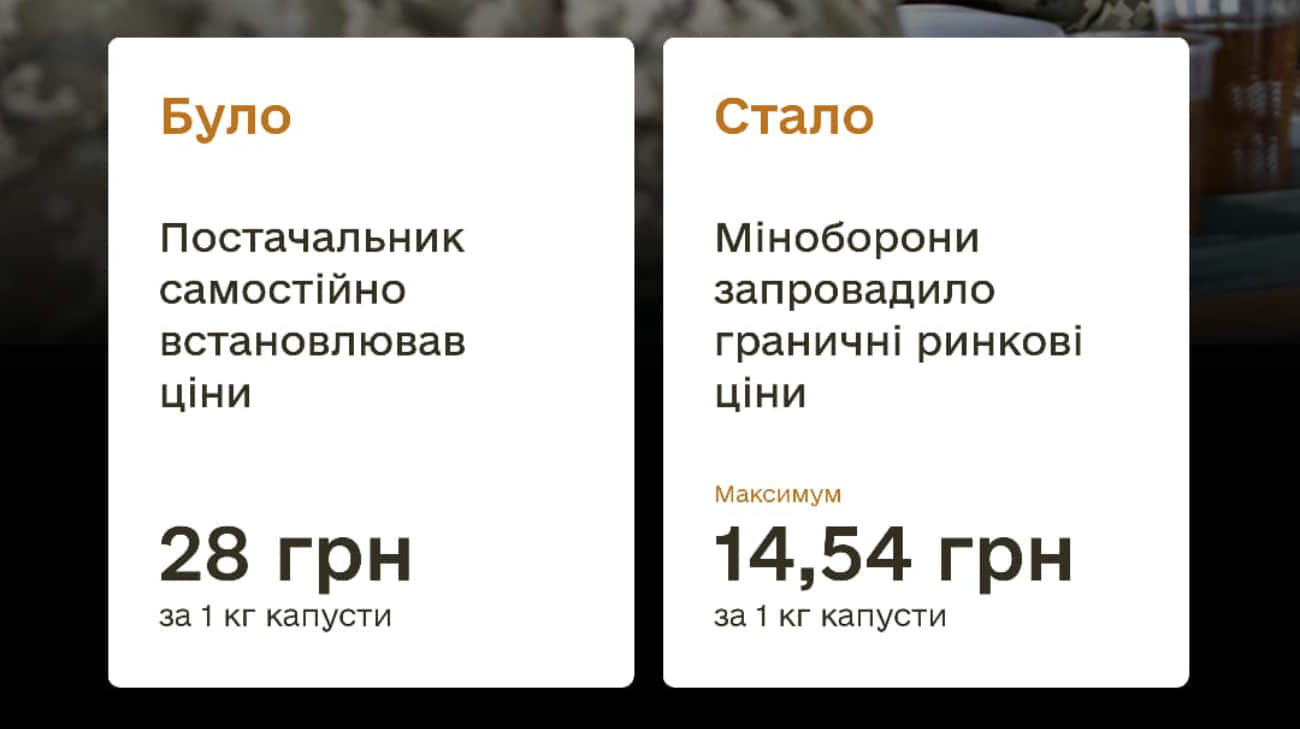Ukraine's Defence Ministry ensures no army procurement scandals in the future, prepares new mechanism
The Defence Ministry of Ukraine has stated that it is collaborating with law enforcement agencies to eliminate the risks of corruption in procurement for the Armed Forces, while simultaneously implementing a new procurement architecture in line with NATO standards.

The Defence Ministry of Ukraine has stated that it is collaborating with law enforcement agencies to eliminate the risks of corruption in procurement for the Armed Forces, while simultaneously implementing a new procurement architecture in line with NATO standards.
Source: Ukraine's Defence Ministry
Details: The message explains that until May 2023, suppliers could set prices for the food products delivered to military units independently.
To achieve this, they set unfairly low costs for the entire set of food on the eve of the tender, including all products. This allowed them to win the tender. After winning, the supplying company changed the prices of specific products, increasing the prices for mass goods such as vegetables, fruits, dairy and meat products, etc. They would then decrease the prices for less common items, such as strawberries or loquats. This allowed them to keep the overall price of the food set unchanged. Under this scheme, the infamous "eggs for US$0.5 each" appeared, the Defence Ministry says.
To prevent such abuses, the ministry has introduced product price caps, above which suppliers cannot provide products to the military. For example, the National Anti-Corruption Bureau of Ukraine says, previously suppliers set the procurement price for potatoes at UAH 16/kg (US$0.5), but in December 2023 the Defence Ministry set a price cap of UAH 10.35 (US$0.3) on one of the tenders. The situation is similar with cabbage (28 UAH and 14.54 UAH, respectively) and onions (39 UAH and 22.86 UAH, respectively).
The ministry also adds that a fundamental procurement reform has been initiated. The new system involves a two-tier mechanism, where the Defence Ministry establishes procurement rules and ensures quality control. In contrast, the new agency, State Logistics Operator, carries out the actual procurement. Previously, these functions were centralised within the ministry, which could lead to conflicts of interest. The distribution of responsibilities is intended to eliminate corruption risks, as stated by the ministry.
The State Logistics Operator has announced the first tenders under the new procurement system in the Prozorro system, which will be launched in the year’s second quarter [the Prozorro system is a public electronic procurement system where state and municipal customers announce tenders to purchase goods for the opportunity to become a state supplier – ed.].
Background:
- On 21 January, ZN.ua, referring to the agreement of the Ministry of Defence on the procurement of food, reported that the ministry purchased food for servicemen at a cost two- to three-times higher than that in Kyiv stores. Bohdan Khmelnytskyi, then-head of the State Procurement Department at the Ministry of Defence of Ukraine, who was involved in a case of embezzlement of US$580,000 during the procurement of military ammunition, was the one who signed the December agreement with the food company on behalf of the ministry.
- Information about eggs "for US$0.5 each" became especially controversial.
- The Ministry of Defence called this information a lie and manipulation and promised to contact the Security Service of Ukraine (SSU). Oleksii Reznikov, Minister of Defence, rejected the accusations of corrupt practices in the Ministry. Later, Reznikov said in an interview to Ukrainska Pravda that his reaction had been overly emotional, and promised that all facts found by journalists would be thoroughly investigated.
- Vyacheslav Shapovalov, Deputy Minister of Defence, resigned and was fired on 24 January amid the scandal with the food procurement for high prices. On 25 January, the dismissal of Bohdan Khmelnytskyi from the position of head of the State Procurement Department at the Ministry of Defence of Ukraine was announced as well.
- Prime Minister Denys Shmyhal instructed the government to update the state procurement system of the Armed Forces of Ukraine so that the prices of food and products are publicly available.
Support UP or become our patron!



